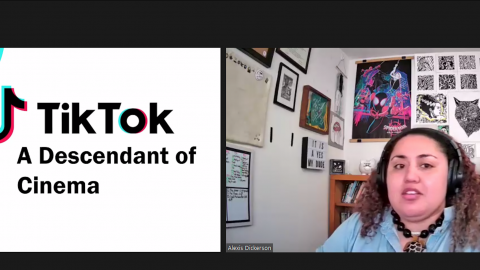
The Read on Film TikTok
Posted on Thu 9 Sept 2021
Cinema Rediscovered 2021 Film Critics workshop participant Ian Wang on the reasons why TikToks about cinema might be less interesting than TikToks as cinema.
Here is the optimistic read on the rise of TikTok, the latest online video platform du jour: never before has a generation been so inadvertently cineliterate. As Alexis Dickerson argued in her presentation on Film TikTok, young people - armed with mobile-friendly video editors and pandemic-induced boredom - are experimenting with the medium in the same way as Georges Méliès might. If the age of silent film was, as film critic and historian Pamela Hutchinson suggested in her Philip French Memorial Lecture, one of “young cinema” - protean, unpredictable, or downright weird - TikTok is as young as they get.
TikTok has generated plenty of headlines but, as a critic, I’m disheartened by the lack of TikTok criticism that has emerged: not of the app or its machinations, but of the form and the content - the same rubric we apply to films.
TikTok should interest us as critics because we are watching an entire generation teach themselves cinematic language in real time. The old barriers to entry are gone. You don’t need an expensive film school education to learn about graphic match cuts - you’ve already seen them in a dozen outfit transition videos. This year, we saw thousands of TikTokers embrace the Adult Swim trend, creating witty, abstract 15-second experiments that bore a visual sophistication far exceeding the superficial professionalism of, say, primetime TV.
Here’s the pessimistic version: that TikTok is teaching young people to view the audio-visual as commodity, not as art. This is certainly the hope of the countless brands who have flooded the platform. TikTok’s endless algorithmic churn ultimately functions as a microcosm of a wider system of information capitalism, one which leeches profit from a vast unpaid labour force - many of whom are Black or otherwise marginalised - while leaving them uncredited.
I see a version of this commodification in the way TikTokers talk about film. TikTok is uniquely placed in the nascent world of online film commentary: unlike its cousins on Twitter or Letterboxd, TikToks can engage directly with the audio-visual content of films, while their short form structure encourages a nimble creativity distinct from YouTube or Vimeo.
Yet the dominant mode of address on Film TikTok - the recommendation supercut - operates not on a level of criticism, but of glorification. Films are presented as idealised expressions of beauty, while any attempt to complicate or contextualise - to explore the possibilities films might offer us beyond beauty - is stifled. This is a conservative view of art, one which favours deference over subversion, staid perfection over productive ugliness.
This is surprising, because when TikTokers are left to their own devices, spared from Hollywood’s looming shadow, they are consistently, irrepressibly experimental. In other words, TikToks about cinema might be less interesting than TikToks as cinema.
And the generative potential of the latter does emerge on Film TikTok - in the form of revisionist histories, or jokes. One way to view TikToks might be as Hito Steyerl’s “poor image”: ephemeral, endless reproducible, both a product of capitalist exchange yet riotously disruptive towards it. If TikTokers can heed her call that “It is about defiance and appropriation just as it is about conformism and exploitation,” perhaps they can truly invent a new young cinema for the 21st century.
Ian Wang
Ian Wang is a writer based in London and Manchester. He likes thinking about film, memory, the East Asian diaspora, and internet culture, and his writing often explores the relationships between all four. He is also particularly interested in the history of international animation. His writing on film and culture has been published in the Quietus, Little White Lies, Dazed, Hyperallergic, It's Nice That and Bright Wall/Dark Room. He was previously an intern at the Guardian.
Follow Ian on Twitter @iantwang
